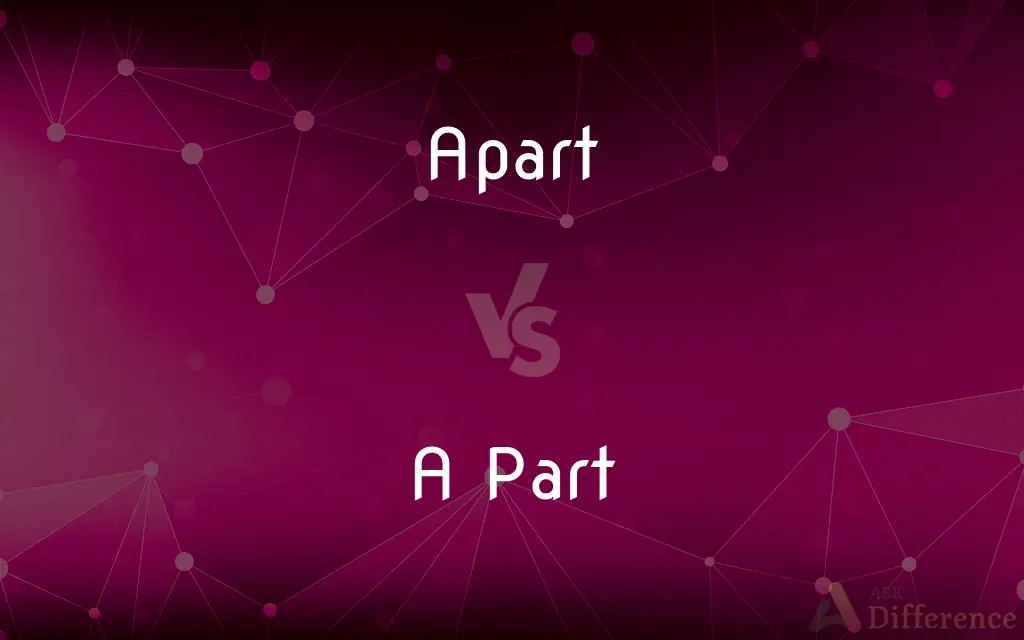Apart vs. A Part — What's the Difference?
Edited by Tayyaba Rehman — By Fiza Rafique — Published on November 22, 2023
"Apart" means separated by a distance or distinct. "A part" means a portion or segment of a whole.

Difference Between Apart and A Part
Table of Contents
ADVERTISEMENT
Key Differences
"Apart" and "A Part" are common English terms that, while similar in spelling, hold very different meanings. "Apart" is an adverb that implies a separation between things, either physically or metaphorically. It can convey the sense of items being at a distance from one another, or refer to different aspects of a situation or thought. For instance, you might say two people live miles apart or that they grew apart over time, indicating either physical or emotional distance.
On the contrary, "A Part" is a phrase where "a" serves as an article and "part" as a noun. Together, they convey the idea of a portion, piece, or segment of a whole. For example, you might mention that someone is a part of a team or that a chapter is a part of a book. The emphasis here is on inclusion or being within a larger entity or group.
When you use "Apart", you are often focusing on differences, separations, or exclusions. It marks boundaries and distances. In contrast, when you use "A Part", you're emphasizing connection, inclusion, or membership. It's about being inside or belonging to something larger.
For clarity, it's always crucial to discern the context when using "Apart" or "A Part". Incorrect usage can lead to misunderstandings, given their opposite implications. While "Apart" emphasizes separation, "A Part" focuses on unity and togetherness.
Comparison Chart
Part of Speech
Adverb
Phrase (Article + Noun)
ADVERTISEMENT
Meaning
Separation or distance
Portion or segment of a whole
Connotation
Difference, exclusion
Inclusion, belonging
Example Use
"They live apart."
"She is a part of the committee."
Grammatical Function
Describes how things relate in terms of distance or difference
Describes something's relationship to a larger entity
Compare with Definitions
Apart
Separated by a distance.
Their houses are three miles apart.
A Part
A segment or portion of a larger whole.
He is a part of the orchestra.
Apart
To be in different places.
After college, they moved apart.
A Part
Denotes membership or affiliation.
Are you a part of any clubs?
Apart
Indicating difference or distinction.
These two topics are worlds apart.
A Part
Involvement or inclusion in something.
She wants to be a part of the solution.
Apart
Not together.
They chose to live apart after the argument.
A Part
A piece of something larger.
This chapter is just a part of the entire book.
Apart
At a distance in place, position, or time
Railings spaced two feet apart.
Born three years apart.
A Part
A specific role or function.
His contribution was a part of the project's success.
Apart
Away from another or others
Grew apart over the years.
Decided to live apart.
Apart
In or into parts or pieces
Split apart.
Apart
One from another
I can't tell the twins apart.
Apart
Aside or in reserve, as for a separate use or purpose
Funds set apart for the project.
Apart
As a distinct item or entity
Quality sets it apart.
Apart
Set apart; isolated. Used after a noun or in the predicate
A people who have existed over the centuries as a world apart.
Apart
Being excepted or excluded from consideration
All joking apart, I think you're wrong.
Apart
Placed separately (in regard to space or time).
Apart
Separately, exclusively, not together
Consider the two propositions apart.
Apart
Aside; away; not included.
Joking apart, what do you think?
Apart
In or into two or more parts.
We took the computer apart and put it back together.
Apart
(following its objective complement) Apart from.
A handful of examples apart, an English preposition precedes its complement.
Apart
(Used after a noun or in the predicate) Exceptional, distinct.
In a class apart.
Apart
Having been taken apart; disassembled, in pieces.
Apart
Separate, on the side.
Apart
Misspelling of a part
Apart
Separately, in regard to space or company; in a state of separation as to place; aside.
Others apart sat on a hill retired.
The Lord hath set apart him that is godly for himself.
Apart
In a state of separation, of exclusion, or of distinction, as to purpose, use, or character, or as a matter of thought; separately; independently; as, consider the two propositions apart.
Apart
Aside; away.
Let Pleasure go, put Care apart.
Apart
In two or more parts; asunder; to piece; as, to take a piece of machinery apart.
Apart
Remote and separate physically or socially;
Existed over the centuries as a world apart
Preserved because they inhabited a place apart
Tiny isolated villages remote from centers of civilization
An obscure village
Apart
Not living together as man and wife;
Decided to live apart
Maintaining separate households
They are separated
Apart
Having characteristics not shared by others;
Scientists felt they were a group apart
Apart
Separated or at a distance in place or position or time;
These towns are many miles apart
Stood with his legs apart
Born two years apart
Apart
Not taken into account or excluded from consideration;
These problems apart, the country is doing well
All joking aside, I think you're crazy
Apart
Away from another or others;
They grew apart over the years
Kept apart from the group out of shyness
Decided to live apart
Apart
Placed or kept separate and distinct as for a purpose;
Had a feeling of being set apart
Quality sets it apart
A day set aside for relaxing
Apart
One from the other;
People can't tell the twins apart
Apart
Into parts or pieces;
He took his father's watch apart
Split apart
Torn asunder
Apart
In pieces or segments.
The old watch fell apart with time.
Common Curiosities
Does "apart" imply a previous connection?
Often, it suggests a separation from an original state of togetherness or closeness.
How does "apart" relate to the word "part"?
Although it contains the word "part," its primary meanings are distinct. It's more related to the idea of separation than to a segment or piece.
Is "apart" ever used as a preposition?
Rarely. While it's mostly an adverb, in some contexts, like "apart from," it functions as a preposition meaning "excluding" or "other than."
What does "apart" mean?
"Apart" is an adverb meaning separated by a distance, or distinct in nature or quality.
Is "apart" a formal word?
No, it's neutral and can be used in both formal and informal contexts.
What's the opposite of "apart"?
"Together" is commonly used as an opposite.
Can you use it in a sentence?
Yes: "The two friends live miles apart."
Does "apart" always imply physical separation?
No, it can also suggest ideological, emotional, or qualitative differences.
Is "a part" ever used to imply inclusion?
Yes, often. Saying someone is "a part of a group" means they are included in that group.
Can "a part" describe a role or function?
Yes, as in: "Her contribution was a crucial part of the project's success."
Can "a part" be replaced with "apart" in a sentence?
No, their meanings are distinct. Using one in place of the other can change the sentence's meaning.
What does "a part" mean?
"A part" refers to a segment or portion of a whole.
How can "a part" be used in a sentence?
For instance: "She wanted to be a part of the team."
Is "a part" two separate words?
Yes, it consists of the article "a" and the noun "part."
Can "apart" describe emotional distance?
Yes, as in: "They've grown apart over the years."
How do you remember the use of "a part"?
Think of "part" as a piece of something. When you want to emphasize inclusion or a segment of a whole, use "a part."
How does "a part" differ from "apart"?
"A part" emphasizes inclusion or belonging, while "apart" emphasizes separation.
Does "a part" always imply a smaller segment of a larger whole?
Typically, yes. It suggests a piece or component of something bigger.
How do you remember the meaning of "apart"?
Think of the prefix "a-" as a form of negation and "part" as unity or wholeness. "Apart" negates that unity, suggesting separation.
Can "a part" be used in various contexts?
Absolutely. It can refer to physical segments, roles in a play, or even metaphorical components of an idea.
Share Your Discovery

Previous Comparison
Plant Cell vs. Bacterial Cell
Next Comparison
Smartphone vs. Normal PhoneAuthor Spotlight
Written by
Fiza RafiqueFiza Rafique is a skilled content writer at AskDifference.com, where she meticulously refines and enhances written pieces. Drawing from her vast editorial expertise, Fiza ensures clarity, accuracy, and precision in every article. Passionate about language, she continually seeks to elevate the quality of content for readers worldwide.
Edited by
Tayyaba RehmanTayyaba Rehman is a distinguished writer, currently serving as a primary contributor to askdifference.com. As a researcher in semantics and etymology, Tayyaba's passion for the complexity of languages and their distinctions has found a perfect home on the platform. Tayyaba delves into the intricacies of language, distinguishing between commonly confused words and phrases, thereby providing clarity for readers worldwide.












































